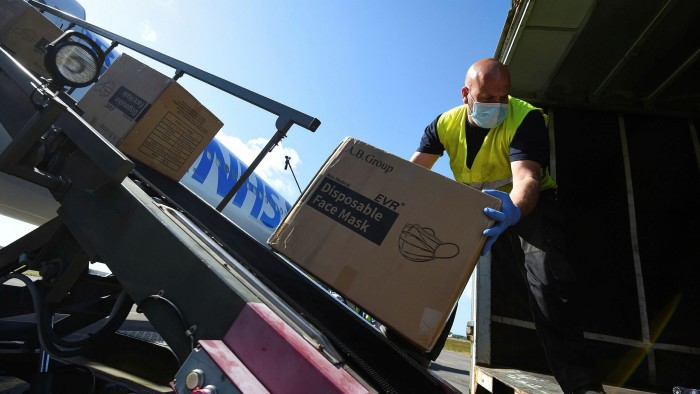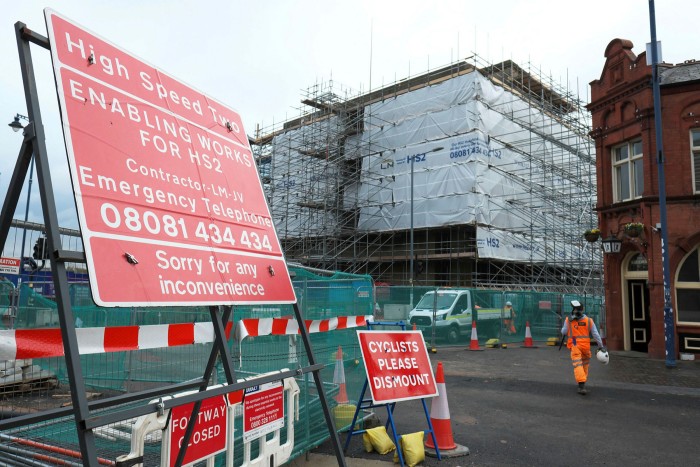Public sector consulting work set to grow despite planned spending cuts

Simply sign up to the Management consulting myFT Digest -- delivered directly to your inbox.
The UK government has long relied on consultants to help deliver public services. But the pandemic took this dependence to a new level.
Thousands of consultants were called in to help respond rapidly to a public health crisis that affected all parts of the government’s operations. Among the tasks handed to private advisers were the procurement of personal protective equipment, the setting up of Covid-19 testing systems and the design of emergency loan schemes for businesses.
As a result, the total value of contracts awarded to consultants by Britain’s government and public bodies more than doubled to £2.5bn in 2020-21, data provider Tussell found. Actual spending was about £1.5bn, according to a person briefed on the government’s own figures, double the “more than £700m” the government said it spent the previous year.
This surging expenditure prompted concerns from the public and the government itself, with former Cabinet Office minister Lord Theodore Agnew saying in 2020 that over-reliance on advisers wastes taxpayer money and “infantilises” civil servants.
Last May, to cut costs, the Cabinet Office launched a consulting hub that can make better use of in-house expertise, upskilling civil servants and using external advisers more efficiently.

Ministers also rolled out a new “consultancy playbook” — setting out best practice for civil servants on how to hire consultants with the right skills and use them effectively. More than 350 civil servants received training on the playbook in the past three months, the Cabinet Office says.
Whether these initiatives are improving value for money will become clearer when the hub delivers its first annual report later this year.
However, these attempts to control spending do not spell doom for consultants. The government’s focus on “levelling up” regional infrastructure, promoting sustainability and improving public sector digital systems are all expected to create more work.
Three-quarters of consultancies expect their public sector practices to grow this year, according to a survey by Savanta for the Management Consultancies Association.
“Sometimes, really major things happen and we . . . need to respond quickly,” says Janet Baker, the former consultant running the hub. “That’s where you need to draw in a variety of experience that we shouldn’t keep [within the civil service].
The hub has set up a platform so knowledge gleaned from external consultants can be reused across the civil service, adds Baker.
But, while this is a “helpful step”, it is “not going to have a revolutionary effect”, says Fiona Czerniawska, chief executive of Source Global Research, a data provider to consultants.
She says the UK government relies heavily on consultants because it “runs very, very lean” compared with other countries, using the private sector to do work it is unable to do internally. And the number of civil servants is set to be cut in coming years, potentially squeezing resources further.
Ministers are therefore likely to keep using consultants to coach civil servants or provide specialist advice in areas such as supply chain management. The only reduction in their use may be for run-of-the-mill tasks.
The consulting hub — which is based in London, Birmingham and Glasgow and continues to recruit — has in-house management and data consultants to advise government departments directly.
Use of these in-house consultants makes sense at a junior level but less so in senior roles, argues Stewart Johns, partner at BearingPoint, a global consultancy. “You might only need someone for 20 days a year,” he says.

Nevertheless, Iain Burgess, government and policy sector leader at EY, reckons external junior consultants will still be needed despite the focus on specialisation. “You can be a supply chain specialist in the making as a graduate,” he says.
For more smaller consultancies to be involved, the government will have to improve the costly and time consuming bidding process, though. “In many cases, frankly, it’s faster and more profitable to do work in the private sector,” says a partner at one firm.
These days, the government increasingly awards contracts through “frameworks”, with firms bidding for a place on a panel of providers and then having to pitch again for individual pieces of work.
“We support frameworks but the quantity of them has gone through the roof in the last year or two,” says Johns, adding that BearingPoint is bidding less often as a result of this.
The government has said that intends to simplify the bidding process to help small and medium firms. However, if the changes do not work, some firms may avoid bidding altogether. “I don’t want to be a gallant second to one of the big firms,” says Johns.
“That’s a huge amount of effort to get nothing.”
Comments